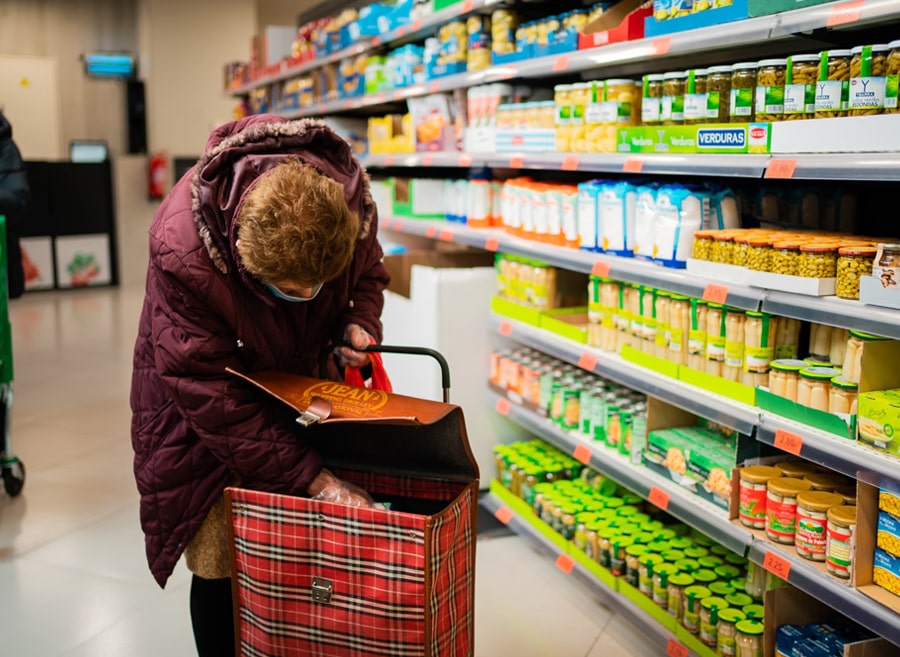- Use reusable bags and containers for grocery shopping to avoid plastic waste.
- Buy in bulk to reduce packaging waste.
- Choose products with minimal or recyclable packaging.
- Make your own personal care products, such as toothpaste and deodorant, to reduce packaging waste.
- Use reusable cloth towels instead of paper towels.
- Compost food scraps to reduce waste sent to landfills.
- Avoid single-use items such as disposable utensils and straws.
- Bring reusable bags: Make it a habit to keep reusable bags handy whenever you go shopping. Whether it’s for groceries or other purchases, these bags can replace the need for plastic or paper bags provided by stores. Picture yourself walking into a grocery store with your trusty canvas tote bag slung over your shoulder, ready to fill it with fresh produce and pantry staples. Not only will you avoid accumulating more single-use plastic bags, but you’ll also show others how convenient and stylish sustainable shopping can be.
- Shop in bulk: Buying in bulk reduces packaging waste significantly. Walk down the aisles of a bulk store with rows upon rows of bins filled with colorful food items – from whole grains to legumes and dried fruits. With your own containers or even repurposed glass jars clinking softly, you scoop out just the amount you need, avoiding unnecessary packaging waste.
- Avoid single-use plastics: Single-use plastics contribute greatly to environmental pollution. Be mindful of avoiding products packaged in single-use plastic bottles or containers when alternatives are available. Imagine browsing through personal care products, carefully reading labels and selecting shampoo bars wrapped in paper packaging instead of plastic bottles. The experience is not only satisfying but also empowering as you vote with your purchasing power for companies that prioritize sustainability.
- Support local and sustainable businesses: Seek out local farmers’ markets, sustainable grocery stores, or community-supported agriculture (CSA) programs. These often prioritize environmentally friendly practices and offer a variety of fresh, locally sourced products. Picture yourself strolling through a vibrant farmers’ market on a sunny morning, surrounded by stalls filled with colorful fruits and vegetables. You engage in conversations with the passionate farmers who grow these crops sustainably, strengthening the connection with your community and supporting businesses aligned with your values.
- Plan your meals and make a shopping list: Planning your meals for the week reduces impulse buying and ensures that you only purchase what you need. This decreases food waste while making your shopping trips more efficient. Imagine sitting down on Sunday evening, armed with your favorite cookbook or recipe app, planning out nourishing meals for the upcoming week. As you jot down ingredients on your shopping list, you feel an immense sense of satisfaction knowing that each item will be put to good use and avoid being wasted later.
Developing a zero-waste lifestyle is now a feasible and achievable objective for anyone worried about the limited resources of our planet. This blog article offers helpful advice and creative suggestions for living a more sustainable lifestyle, regardless of your degree of experience with the green movement or desire to raise your sustainability game.
Practical Tips for Reducing Waste in Daily Life

Understanding Zero Waste Lifestyle
The concept of a zero waste lifestyle revolves around reducing, reusing, and recycling to minimize the amount of waste generated. It’s an approach that aims to send as little trash as possible to landfills or incinerators by adopting sustainable practices. At its core, going zero waste involves a shift in mindset towards consumption and waste generation. By questioning our habits and considering the environmental impact of our choices, we can begin to make conscious decisions that align with a more sustainable lifestyle.
A key aspect of understanding the zero waste lifestyle is recognizing the importance of reducing single-use items. This means opting for reusable alternatives whenever possible, such as using cloth bags instead of plastic ones, bringing a refillable water bottle, or investing in a set of durable and reusable food containers. By embracing these small changes, we can significantly decrease the amount of waste we contribute to our planet.
Practical Tips for Zero Waste Shopping

When it comes to adopting a zero-waste lifestyle, one of the most impactful areas to focus on is our shopping habits. By making conscious choices and embracing sustainable practices, we can minimize packaging waste and contribute to a cleaner environment. Here are some practical tips for zero waste shopping:
Now that we have explored practical tips for zero waste shopping, let’s dive into another crucial aspect of living sustainably – choosing eco-friendly products.





